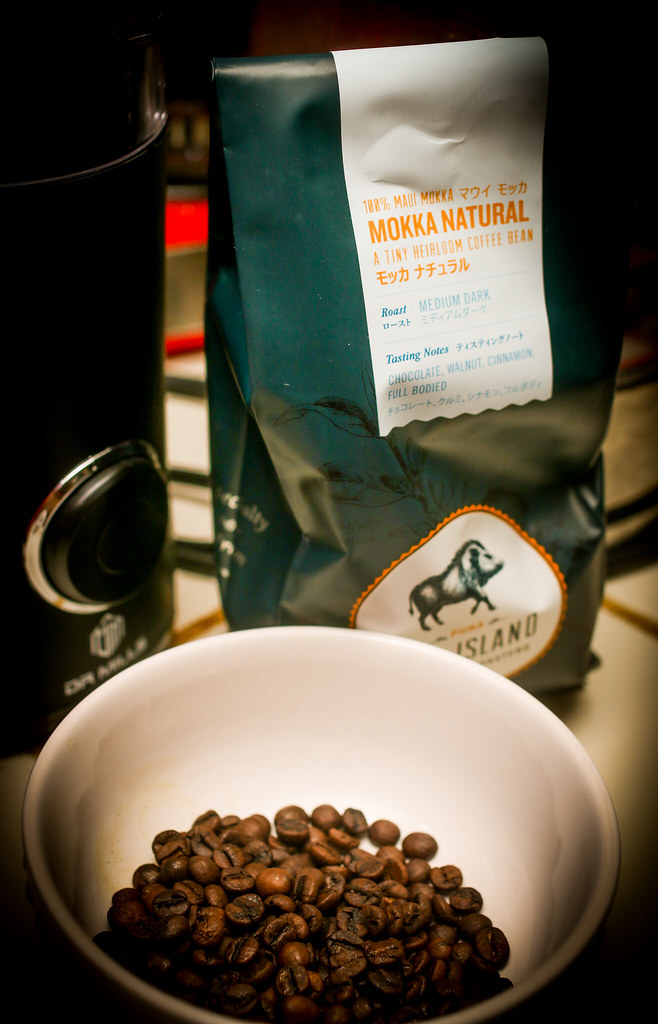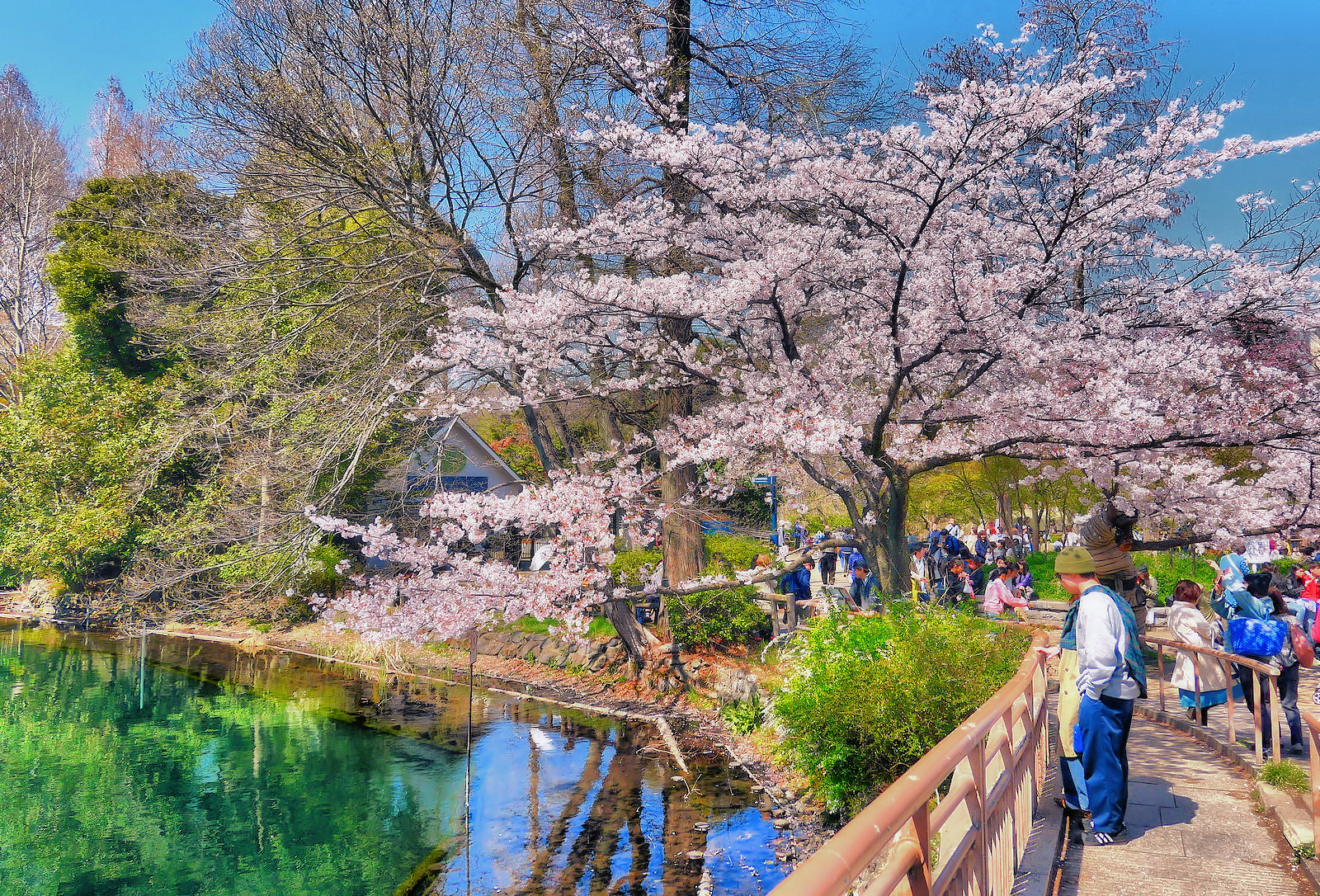
I am back with another review for 100% Maui Mokka which features the tiny peaberry. And this time, experiencing Maui Mokka from Big Island Coffee Roasters from Hawai’i.
Peaberry (aka Caracol in Spanish) is a type of coffee bean and usually, the fruit of a coffee plant contains two seeds (which are the beans) that develop with flattening facing sides. Sometimes only one of the two seeds are fertilized and the single seed develops with no flattening. The oval/pea-shaped bean is known as a peaberry (this happens to about 5% of coffee beans).
Now how did the name Maui Mokka get its name? It is said these tiny beans are a spontaneous cross of an heirloom Yemenis Mokha with a Maui Typica.
So, how do farmers know whether it’s a single or double header inside, well Hawaiian coffee are hand assorted after picking and because it can be laborious work, sometimes peaberry can cost a little bit more than typical coffee beans.
So, here is a size comparison with the maragogype, typica (the usual size of bean) and the far right is the peaberry.

While coffee from Hawai’i is typically known for being grown in the Kona and Ka’u District of Hawai’is Big Island, Coffee is also produced in Maui, the second largest island in Hawai’i.
Looking at the map, you can see the big Healeakala volcano near upcountry and East Maui. This is a massive shield volcano which formed more than 75% of the Hawaiian Island of Maui, the other from Mauna Kahalawai in the west. The last eruption was in 1790 and there are numerous companies that cultivate coffee from the rich volcanic soul of this huge volcano.
But on the western side of Maui.
The other volcano on the western part of the island is Mauna Kahalawai (West Maui Mountains or “Hale Mahina”). This volcano is an eroded shield volcano which has not erupted since 320,000 years ago.
Many coffee is produced in the west at the Ka’anapali Estate near Lahaina and at the foothills of Mauna Kahalawai and an area known at one time for its wet-taro cultivation.
Now Mohka (or Mokka) coffee beans grown in K’anapali, Maui are grown in this rich volcanic soil and Mokha comes from the fact that the beans are sweet and chocolate tasting.
The bigger the bean, doesn’t mean its the best quality because the peaberry, these Mokka tiny coffee beans shouldn’t be taken for granted. They came first place in 2014 for the Hawai’i Cupping Competition and becoming the best Hawaiian coffee in commercial division entrants.
They are also a challenge for farmers to harvest as it has the habit of alternate bearing, meaning they ripe at very different times of the year, year to year and yield is typically light.
But you may be wondering, I just reviewed Mokka before, why review Mokka again?
Well, like any coffee bean, depending on who roasts it, you get different flavors.


This time I am reviewing Big Island Coffee Roasters 100% Maui Mokka.
As mentioned in previous review of Big Island Coffee Roasters, the award winning coffee roaster from an area not known for coffee, Puna.
Puna is the district on the Big Island’s south east shore. The district is known for its freshwater springs and volcanically heated tide pools. The whole coastline is made up of lava rock and the eastern flank of the Kilauea volcano is located in the Puna district.
That is where Big Island Coffee Roasters is based, the coffee I am reviewing has beans which originated from Ka’anapali, Maui.
I recently received of September 2020 Maui Mokka ala a fresh crop for the year and for Maui Mokka, whether you drink it straight or drink it with cream, this coffee is sweet, fudgy, big-bodied, fragrant medium-dark coffee.
The notes are of dense dark chocolate, roasted walnuts, cinnamon, nutmeg, rose and is full-bodied. Soft in acididty and I have to say if you are looking for a safe coffee to introduce people to Hawaiian coffee, Maui Mokka is great (unless they are coffee connoisseurs and prefer complex coffee and are not into sweet coffee).
This is very good coffee and so far, when it comes to offerings from Big Island Coffee Roasters, it’s delicious. It’s absolutely delicious!
With that being said, you’re going to meet coffee snobs who don’t like the safeness of the peaberry/Maui Mokka. I think those who prefer complex, non-sweet coffee would rather not be near Peaberry coffee or Maui Mokka, if they like a more complex taste.
Sure, I’ve been called a coffee snob myself but as I love complex coffee, I also enjoy the peaberry, and enjoy Maui Mokka. For me, it’s about the experience and trying something different each day. I can do that.
Maui Mokka for those who want a delicious, sweeter coffee that I feel is the Hawaiian coffee to introduce to newbie friends who have never tried Hawaiian coffee and are casual drinkers who aren’t sure if they like medium roasted or dark roasted coffee, but also use sugar and cream. It’s a safe coffee that you can’t go wrong with, may it be with yourself, family or friends.
Now have I noticed a big difference with Big Island Coffee Roaster’s Maui Mokka with other Hawai’i based makers of Maui Mokka. I did taste the roasted walnuts but it’s the chocolaty, fudgy flavors that you taste the most with slight spice. But with that being said, I have not tried a bad Maui Mokka yet (thank goodness) and Big Island Roasters offers a great price for their Maui Mokka (100% Maui Coffee) for $25 for 10 oz.

With that being said, while this small bean grown in Ka’anapali, Maui Mokka is becoming well-known, Big Island Coffee Roasters also has another peaberry offering and its the Kona Peaberry (100% Kona Coffee). Two different Hawaiian islands… Two different tastes? I can’t wait to try it! I will be reviewing it soon.
